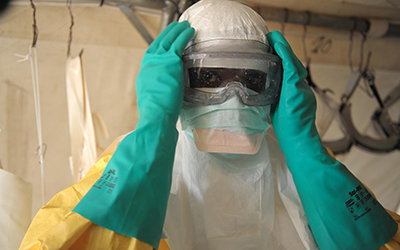We have seen a series of disease outbreaks in Malaysia. SARS, Nipah virus, Japanese encephalitis, H1N1, to name a few.
The effects from those outbreaks are shattering. Fathers lose their sons, daughters lose their mothers, and the basic family unit breaks down. Health care workers are not spared too, having to leave their families to care for the sick in a quarantine bay. Devastating. But it does not have to be that way with your help.With a little bit of knowledge and common sense, you can help to weather the rough seas – making it a minor rock in the boat.
Here are some things worth considering in an event that you are heading for during the disease outbreak season.

Source: america.aljazeera.com
RULE 1: PANIC? WHO’S PANICKED?
When you are in a panic state, your mind is not in the right frame. Your thought process goes berserk. And you cannot pull out the logics from the illogical.
Imagine if the pilot panics in an emergency landing. With so many blinkering buttons in the cockpit’s dashboard, being panicked does not help at all. It shows how keeping calm and cool is dead important to help you make the right decisions, making the landing less bumpy.
Do not get influenced by movies. Movies with disease outbreak themes are usually graphical and overemphasised.
In an outbreak, lots of information will be thrown at you. There are many helpful people out there who want to share their experiences and things that work for them. You may feel overwhelmed and press the panic button. Pressing the share button will ignite and spread the panic wildfire.
So, putting the plug to being panicked starts with you.
RULE 2: GET THE CORRECT SOURCE OF INFORMATION
It is the responsibility of the local health authority to give out recent and reliable information to help douse impending panic attacks. In the local scenario, Malaysia Ministry of Health works together with the World Health Organization and the neighbouring health authorities in handling international scale outbreaks. It is the responsibility of countries under the umbrella of WHO to share reliable and validated information with other countries. All in the name of helping mankind.
Chancing can also occur in such situation. Product sellers may take advantage of the situation making sensational claims of their products. The point is, if product marketers claimed strongly that their product really save lives, it should be proven with data and solid scientific outcomes – not testimonials. Proven cure should be shared with others, internationally.
Well, may be, I should not spoil the party by dismissing the placebo effects after all.
RULE 3: MAKE SURE YOUR VACCINATION IS UP TO DATE
Vaccination is the most important tool in preventing diseases. The more updated your vaccination schedule is, the better you will fare, especially if the disease outbreak is a vaccine preventable one.
Watch out for the latest information from the local health authority on the availability of the latest vaccine against the on-going outbreak.
RULE 4: FOLLOW INSTRUCTIONS OF THE AUTHORITY
The ministry of health will have a bird’s eye view of the situation. They have access to the best brains in the country and internationally to curb the outbreaks.
So if you were told to refrain from bringing your children to the playground, please refrain and stay indoors! If you were told to wash your hands, practice it!
If you have been exposed to a case in the plane and told to home quarantine yourself, please take it seriously. After all, it is the much needed rest from your hectic life.
RULE 5: REFRAIN TRAVELLING TO OUTBREAK AREAS
This is the most sensible things that many people fail to do. It is either they have not been watching the news or just plain ignorant.
The benefit of doing so are, you will not be at risk of contracting the disease and you will not help spread whatever germs from the outbreak site. You may turn out fine from the site, but due to the long incubation period of certain germs, some diseases show symptoms weeks after you have caught the bug.
RULE 6: LIMIT CONTACTS EVEN THOUGH YOU ARE WELL, ESPECIALLY SENIORS, CHILDREN AND PREGNANT MOTHERS
Ever wonder why most TV advertisements target children, senior citizens and pregnant mothers? These are the risk groups.
Their immune system are less robust and not fortified against a host of germs. Symptoms are more severe should they become infected. Therefore, if you are among them, please limit your physical contact outside if it happened that you live within an outbreak zone. Still need to communicate? Go online!

Source: msutoday.msu.edu
RULE 7: HYGIENE
This is the basic of living healthy. If you are hygienic, there is no chance for the disease agents (germs, mice, mosquitoes, cockroaches) to survive and multiply.
Take a good bath, frequently wash your hands, cover your nose when you sneeze, sanitise your home, whatever it is, keep a spick and span environment to make it hard for the germs to flourish. It’s your right to a healthier home. Who would like to call themselves proud driving a muddied Ferrari?
Cleanliness is closely related to hygiene. Cleanliness should not be confine to your homes only. Blocked drains, overflowing bins and deadwoods in front of your house is under your responsibility, not the council’s.
RULE 8: INFORM YOUR LOCAL HEALTH FACILITIES WHEN YOU SUSPECT THAT YOU MAY HAVE THE SYMPTOMS.
Do yourself and others a favour by “surrendering” yourself to the health authority if you have any of the symptoms referring to an ongoing outbreak within your site. First, you will get treated early and early treatment predicts better cure chances. Do not report yourself to the bomoh or the sinseh as they will not know about the disease other than its’ names only.
Secondly, you save many others from being your “down-line”. People who were exposed to you will be monitored or treated preventively. People would thank you for saving their life when you get yourself treated early.
The health authority view outbreaks seriously and we think you should too. If you are wondering what you could do for the country, these are among the no frills initial steps. Remember, you are the player in the outbreak game.
Dr. Helmy Hazmi is a community medicine specialist with a major in Epidemiology and Biostatistics. He is currently working in his hometown, Kuching, as a medical lecturer. Find out more in The Team page.
[This article belongs to The Malaysian Medical Gazette. Any republication (online or offline) without written permission from The Malaysian Medical Gazette is prohibited.]
